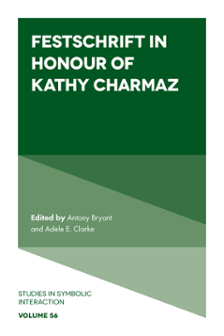
Index
Festschrift in Honour of Kathy Charmaz
ISBN: 978-1-80455-373-2, eISBN: 978-1-80455-372-5
ISSN: 0163-2396
Publication date: 14 November 2022
Citation
(2022), "Index", Bryant, A. and Clarke, A.E. (Ed.) Festschrift in Honour of Kathy Charmaz (Studies in Symbolic Interaction, Vol. 56), Emerald Publishing Limited, Leeds, pp. 211-215. https://doi.org/10.1108/S0163-239620220000056017
Publisher
:Emerald Publishing Limited
Copyright © 2023 Antony Bryant and Adele E. Clarke. Published under exclusive licence by Emerald Publishing Limited
INDEX
- Prelims
- On the Edges of Grounded Theory: ODE to Kathy
- Older, Wiser, and Much More Daring: On Kathy Charmaz's Creative Explosion c1995–2020
- Kathy's Context: In Spite of…
- Promoting Social Justice with Grounded Theory: Applying the Grounded Text Mining Approach to Deposition Analyses
- Wispy Selves: Identity and Identification on History's Edge
- “Indigenization” of the Grounded Theory Methodology (GTM): An Unfinished Conversation with Kathy Charmaz
- Kathy Charmaz and Critical Grounded Theory: Memories, Reflections, and Contributions
- Forging New Directions for Qualitative Sociology: The Legacy of Kathy Charmaz
- Humanizing and Decolonizing Grounded Theory: A Journey Lived by Kathy Charmaz
- A View From the Corner
- Embracing a Legacy, Enabling Social Justice Research Through Constructivist Grounded Theory
- The Legacy of Kathy Charmaz's Scholarship and Mentorship: Enacting Her Constructivist Principles Through Critically Reflexive Grounded Theory Practice
- Adapting Constructivist Grounded Theory and the New Sociology of Childhood to Study Children's Everyday Experiences and Social Life
- Research Practice in the Interregnum: An Appreciation of the Work and Vision of Kathy Charmaz
- Part I New Empirical Studies
- Politeness as Collective Facework: The Case of Swedish Jante Law
- Index